#Hubal
Explore tagged Tumblr posts
Text
Female to Male Body to Body Massage In Gokul Road Huballi 9008468675
Call 9008468675
Welcome to the Heaven of Relaxation Lavana Spa in Huballi at Lavana Spa, we have a special branch at Gokul Road, Huballi where we offer body to body massage by beautiful female therapists. Meet our high-figure girls for body to body (b2b) massage in Gokul Road, Huballi with a happy ending and full services. Here the female masseuse uses her curvaceous naked body. She rubs it against your own in a manner that gives you unimaginable pleasure. She makes her body rub, glide and slide over every part of your body in order to give you sensual feelings. As she does this, she is also massaging your muscles. With such a combination of bodily pampering, you experience feelings of immense pleasure with a happy ending.


https://www.linkedin.com/in/lavana-spa-hubballi/
https://lavanaspahubballi.blogspot.com/2024/05/extra-service-female-to-male-body-to.html
#body massage in gokul road#spa in gokul road#spa in rn shetty rd spa in gokul road huballi#massage in rn shetty rd#massage spa in rn shetty rd#thai spa in rn shetty rd#massage center in rn shetty rd#nuru massage in rn shetty rd#four hand massage in rn shetty rd#couple massage in rn shetty rd#spa in rn shetty rd#massage near me#spa near me#massage spa near me#female to male spa in rn shetty rd#body to body massage in rn shetty rd#massage in gokul road huballi#thai spa in gokul road huballi#massage spa in gokul road huballi#body massage spa in gokul road#chocolate massage spa in gokul road huballi#luxury spa in gokul road#spa in gokul road huballi
1 note
·
View note
Text
☽◯☾₊‧⁺˖⋆ Goddess Worship: An Introduction of Hekate ⋆˖⁺‧₊☽◯☾
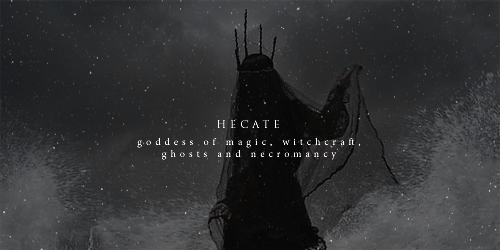
Note: Hey guys. I am indeed very late for the calendar but. life lately has been erratic and complicated. Today we have the last introduction of deities I work with/worship. This post is to provide some information about the deities but also how I work with them personally. Everyone has their own methods with the Gods, and you should do whatever feels right with you while also respecting the bases of the religions.
─── ⋆⋅☆⋅⋆ ───── ⋆⋅☆⋅⋆ ───── ⋆⋅☆⋅⋆ ───── ⋆⋅☆⋅⋆
Historical Background:
Hecate (or Hekate) is a goddess from the Greek pantheon associated with magic, witchcraft, the moon, night, necromancy, and crossroads. Her origins are debated, but she appears in Greek mythology as a powerful and ancient deity, sometimes associated with the Titans or as a daughter of the sky god Perses and the star goddess Asteria. She is also linked to the pre-Greek civilizations, potentially from Thrace or Asia Minor, where her worship may have originated based on the most recent archeologic studies. As the deity of crossroads with the power of navigating between worlds, we find several counterparts on other mythologies/religions: Exu, Papa Ledga, Janus, Odin, Hubal, ect

Atributes and Symbols:
Torches: Hekate is often depicted holding two torches, symbolizing her ability to illuminate the unseen or unknown. Hekate is the goddess of magic, she is believed to be able to cross both the dead and living realm Keys: Mostly linked for her to be a guardian and also to hold secrets. Dogs: Dogs are sacred to her, especially black dogs who seem to be her loyal companions Snakes: they symbolize her connection to the underworld. Crossroads: Hekate is associated with the liminal spaces where three roads meet, symbolic of her power over transitions and the boundaries between worlds. Moon: Her magic is tied to the moon phases, which is why most people who worship her will perform rituals during the moon phases.

Worship and Rituals:
Deipnon: The Hekate's Deipnon was a monthly offering made at each new moon, where supplicants left food offerings (bread, cheese, eggs, garlic, and fish sometimes wine as well and basically what they had to offer in her honor) at crossroads to appease her and ask for her protection. Crossroads Shrines: Small shrines or altars to Hekate were frequently placed at the boundaries of homes, gardens, or towns, especially near crossroads. Worshipers would leave sacrifices like incense, honey, and eggs. Witchcraft and Magic: Hekate is invoked in spells, particularly those related to protection, divination, necromancy, and curse work. Her role as a liminal goddess gave her the power to grant access to the underworld and the unseen forces. However Hekate is a very strong presence and not for begginers as your spells can turn against you if you aren't experienced enough.

-> When worshipping Hekate, it is fundamental to make offerings during every moon phase to apease her energy and allow it to flow through you during your spells. An altar/shrine is mostly necessary if you want to work with her. Offerings can be given to her at her altar for three days before you can remove them and dispose of them in a crossroad for the wandering spirts.
-> Ideas for offerings: Wine, honey, bread, garlic, fish, eggs, keys, snake symbols or dogs symbols, blood, crystals tarot cards, prayers

BIBLIOGRAPHY:
"Greek Religion" by Walter Burkert "Hekate: Liminal Rites" by Sorita d'Este and David Rankine Marquardt, P. A. (1981). A Portrait of Hecate. The American Journal of Philology, 102(3), 243–260. https://doi.org/10.2307/294128 Boedeker, D. (1983). Hecate: a transfunctional goddess in the Theogony?. Transactions of the American Philological Association (1974-), 113, 79-93. Daşbacak, C. (2008). Hecate cult in Anatolia: Rituals and dedications in lagina. Anados 6-7/2006-2007 Studies of the Ancient World
134 notes
·
View notes
Text
Arabian paganism appreciation post PART 2

It seems like not many people are aware of the existence pre-islamic deities from the Arabian Peninsula!
So here are some prayers to Arabian pagan gods!
Hubal
Lord Hubal, the patron of warriors, and great god of divination. As you are the one who can see our fate, aid me in changing myself for the better. Help me become a better, stronger version of myself. With you, i have nothing to fear of.
Shams
Shams, The shining, great goddess of Sun. Bring me light into my life, help me be happier with myself and my life. Scare off people who wish me harm, as you frightened men from the beginning. Thank you Lady Shams.
Al-Qaum
King of the night, mighty god Al-Qaum, aid me in my hardest battles. Help me endure my toughest wars. I honor you, the great god of war, the one who protected us for centuries. Thank you!
78 notes
·
View notes
Note
BY HUBAL'S ARROW, THOSE ARE THE CURLS OF MY CUNTY VIZIER
oughgh im such a thirsty vizier... you have to make me a eunuch
7 notes
·
View notes
Text
I know this wasn't intentional and I highly doubt someone will bring this up but it's hilarious how Yehya jumped from one God loosely associated** with the moon to a full on Pagan moon god who he kind of detests.
** Lose association:
Use of crescents in Islamic culture because of Ottoman tradition. islam doesn't have much going on for moons other than following a lunar calendar.
In the Quran God explicitly mentions he does not father children (human quality) and explicit mention of Hubal's (moon god) daughters as example of blasphemous worship by Arab Pagans and assigning human qualities to him.
The prophet's father grandfather (sorry mouthfull) deciding against sacrificing him (then later the prophet himself) to Hubal
Probably doesn't count much but the whole "allah is a moon god" thing that Westerners were going on about.
2 notes
·
View notes
Text
The Arabs did not possess images of gods, but worshipped sacred stones (baityl), which usually remained unworked. These were touched, kissed and circled: according to Ibn al-Kalbi, the circulation was called tawaf طواف / ṭawawāf - as in Islam - or, especially in pre-Islamic and early Islamic poetry, dawar. دوار / dawār.
Such stones were called al-ansab الأنصاب / al-anṣāb; Ibn al-Kalbi writes: "The Arabs possessed dust-colored stones that they had set up. They circled them and sacrificed by them. They called them al-anṣāb." Animals were sacrificed at the cult stones and sprinkled or smeared with the blood. Such stones are already described by Herodotus.
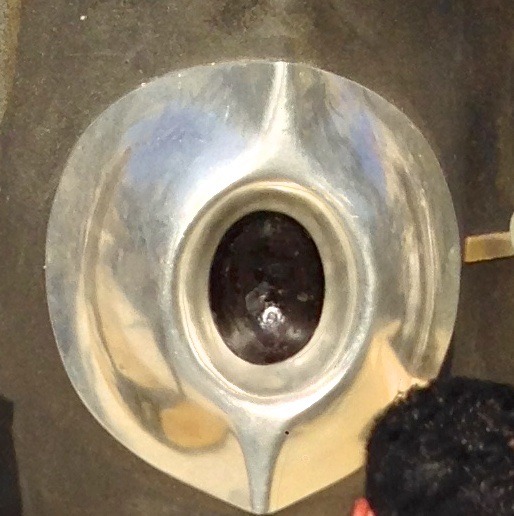
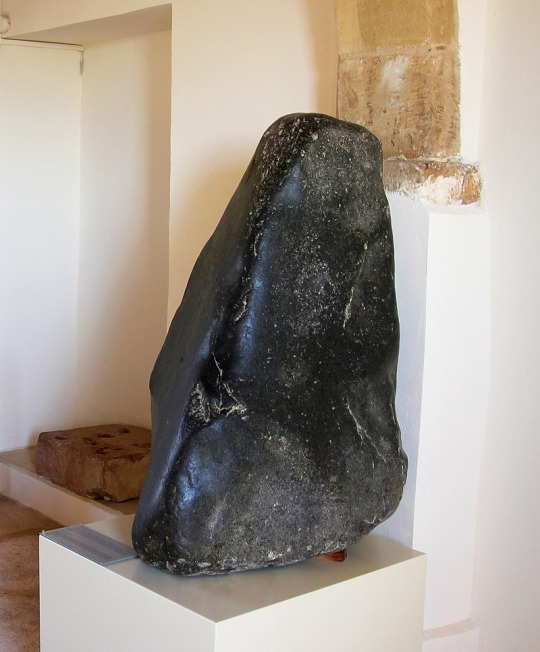
The Kaaba (الكعبة) in Mecca - built by Ibrahim according to Islamic belief and supposedly of heavenly origin - was already an important shrine in pre-Islamic times.
Within the sacred precinct was not only the famous black stone, but also the figure of Hubal made of red carnelian and the sacred well Zamzam. The "ansab" were unhewn stones that were placed in private houses/tents; they were gradually replaced by idols (ṣanam/aṣnām) as molded statues. According to al-Azraqi, there was no house in Mecca without an idol on the eve of Islam.
According to the report by al-Maqrizi, there were idols in Yathrib that were worshipped by the entire tribe or extended families of the tribe together in public acts of worship. They were set up at the meeting place, the so-called madschlis مجلس / maǧlis, under the supervision of the tribal leader. Idols for personal use were made and sold in pre-Islamic Mecca.
The black cone-shaped stone in Kouklia (Cyprus), which was worshipped as Ištar-Astarte and later as Aphrodite.
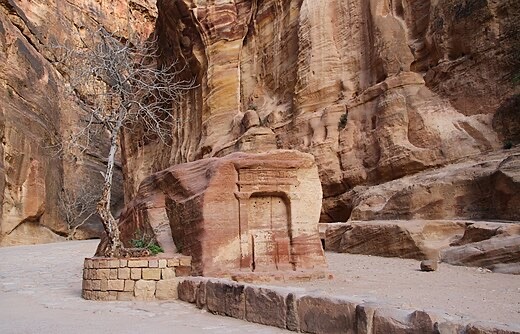
The black, square, unhewn stone of the god Dushara, whom the Nabataeans worshipped in Petra, is placed on a golden pedestal. According to Suidas, his idol was a four-foot-high black cuboid on a golden pedestal. Epiphanius (4th century) reports that the god was born from this cult stone (Baitylos) called Chaabu (Χααβοῦ), which was like his mother. The name is placed either with the Arabic kaʿba "cube" (see also: Kaaba) or ḥawwāʾ "Eve". The latter would then have been a mother goddess.
The stone of Bet-El (north of Jerusalem), which the Canaanites worshipped as the residence of the god El.
The stone of Zeus Kasios in Seleukeia Pieria (Syria).
The Stone of Emesa (Homs in Syria), which was sacred to the god Elagabal. The Roman emperor Elagabal introduced the cult of this god as a state cult in Rome in 219 and the stone was transferred there. After the assassination of the emperor in 222, the stone was returned to Emesa.
The stone of the moon god Sin in Harran (northern Syria, today Turkey).
The meteor of Aigospotamoi on the Chersonesos in Thrace.
2 notes
·
View notes
Text
Freud, Moses & Muhammad
Have been reading Moses and Monotheism by Sigmund Freud and he argues that because Judaism shows traces of both the cult of YHWH and Egyptian Atenism, it follows that this happens due to the fusion of a group out of Egypt and a mass of midianite converts at Qadesh. I do not necessarily disagree until when he asserts that there were two Moses.
Egyptian Moses - had the name Moses, instituted circumcision, introduced a strict iconoclastic uncompromising monotheism, intentionally neglected the after life. Was most likely an ambitious governor of Goshen under Akhenaten who fancied himself a candidate to the throne but on being sidelined, left the country peacefully in a time of war with a mass of semitic followers and the Levites (educated egyptian atenists). Angry, Jealous, Decisive and Strict which fits the character of an ambitious nobleman.
Midianite Prophet - Either Jethro or his son in law, Passionate and compromising, A prophet of YHWH who was a volcano god, active at night and slumbering in the day. He introduced the name YHWH as well as a mass of rituals but retained circumcision and the centrality of Moses. However, in return, the egyptian roots had to be done away with and everything from Moses to circumcision were to be given semitic origins.
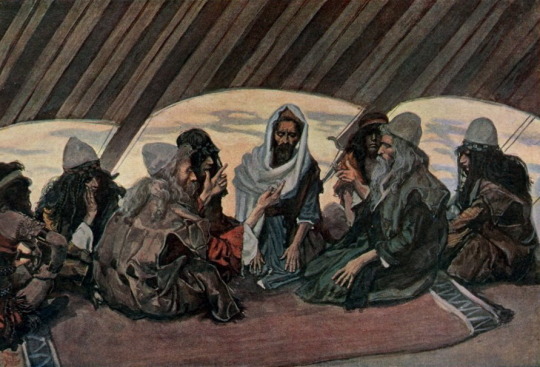
Moses and Jethro by Tissot
This assertion is what I have an issue with and my most basic argument is that Freud might be projecting the originality of modern ideas on to the continuous nature of old world religions. Just because elements found in Atenism and YHWH cults are to be shared with the faith of Moses does not necessitate divorcing him in to two characters or any compromise whatsoever. I will posit the case of Islam (the most recent and final revealed religion) as proof for this with a series of examples which show that Allah does incorporate/allow the continuation of rituals seemingly foreign to Islam (which is an odd assertion as well since both Akhenaten and the Midianites were themselves created by the same god and their thoughts entirely within His grasp)
Allah - a name denoting the One God but had gradually becoming somewhat akin to Elohim and Anu as a passive creator god who had left the rule of His world to Hubal (Baal) and other deities
The Hajj and the Kaabah, once a sanctuary set up by Abraham had long since become the centre of Arabian Polytheism but was restored to Monotheistic worship
Safa and Marwah were idols placed atop two hills that the arabs would run in between but Islam incorporated the practice after destroying the idols and declaring it a re enactment of Hagar running in search of water for Ishmael
Rahman - a name given to the patron god of Yamamah but re purposed for use for The One God
Abraham, Ishmael and Hagar - characters central to both the Judeo Christian world and Arabian mythology were declared proponents of monotheism cleared of their polytheistic baggage
Stoning of adulterers and killing of apostates - retained from Mosaic Law
Fasting on 10th Ashura - re purposing of the Yom Kippur as the Prophet PBUH asserted the muslims have more of a right to the Exodus than the Israelites
Fasting - the Quran explicitly says that it institutes the fasting for muslims just as God has done it for nations before us
A plethora of pre islamic arabian laws were retained in the sharia but modified to be in line with God's plan for example qisas, circumcision, polygamy etc.
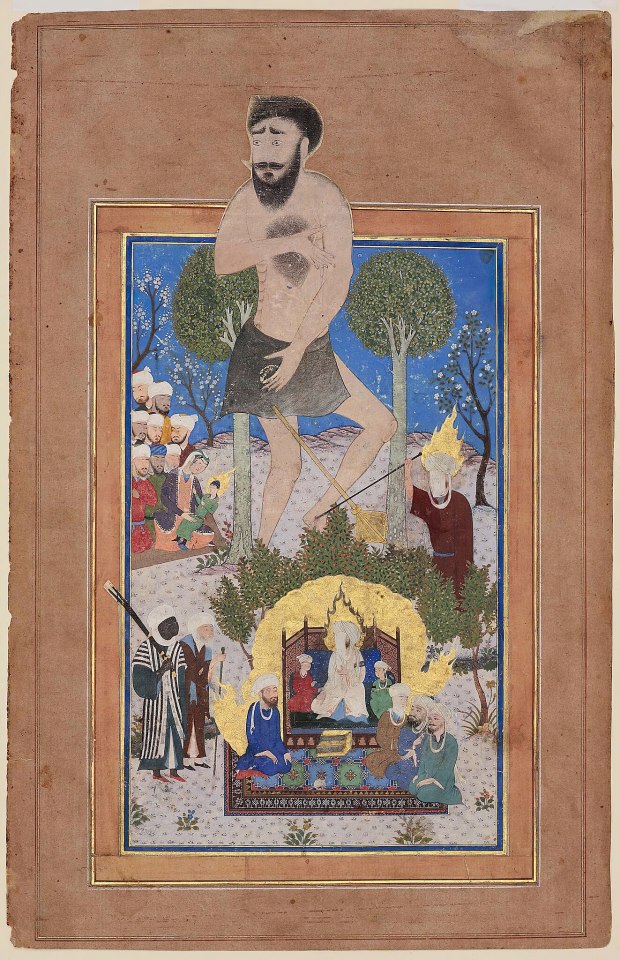
Musa va 'Uj (Top Left: Mary and Jesus, Top Right: Moses battles Og, Bottom: Muhammad with his grandsons and companions)
This is in no way a comprehensive list but I feel it is sufficient to say that Moses' religion "adopting" elements such as the Midianite name for God or Egyptian circumcision or selectively not focusing on the after life in order to separate from their opponents (similar to how Islam has worshippers fold their arms in prayer to distinguish from Jewish prayer or changing the qiblah from Jerusalem to the Kaabah or being discouraged to fast on sabbath etc.). Nor does it reduce God's station and transcendence as it was God Himself in the first place who placed those beliefs and elements in and around His prophets.
God reveals Himself not just in the Book and the Miracle but also in the hissing of a staunch infidel and the uncertain beating of the convert's heart as he latches on to familiar rituals of his ancestors.
#sigmund freud#moses#bible study#quran#islam#prophet muhammad#monotheism#god#christianblr#jewblr#biblestudy#bibleblr#muslimblr#bible#scripture#faith#christian#bible scripture#history#ancient history#ancient egypt#kemetic#allah
3 notes
·
View notes
Text
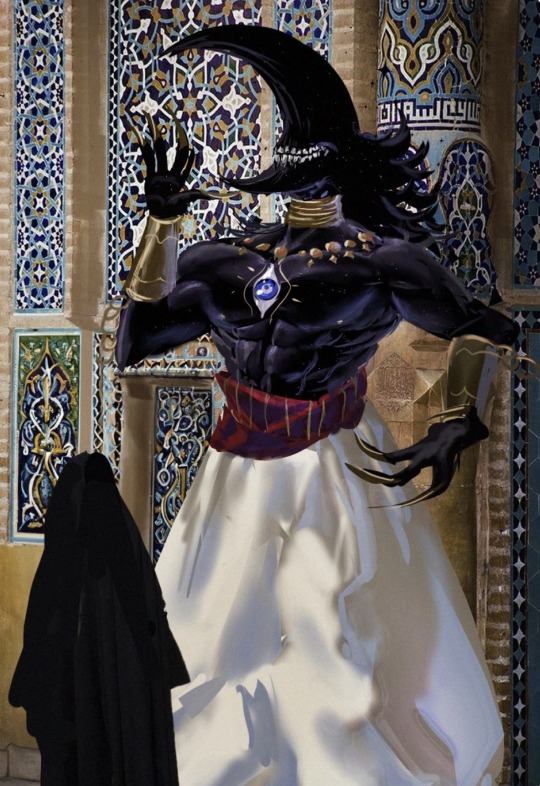
Hubal and the Daughters of God🌙🕋🧞
By:

#fantasy#digital art#digital painting#fantasy art#fantasy creatures#djinn#djinni#twitter art#twitter artist#video game art#video game character
4 notes
·
View notes
Text
The Life of The Prophet Muhammad(pbuh): Before His Birth, His Birth and His Childhood
Hazrat Abdullah, the Prophet’s Father
Abdullah was the eighth among the ten sons. He was much different than his siblings in terms of looks and character.
As soon as he came into this world, the Holy Prophet’s (PBUH) noor that shone on his father’s forehead passed to his. This noor brought out a magnificent beauty and an exceptional cuteness/sweetness to his face. However, nobody noticed from where and how this beauty and cuteness came.
Abdulmuttalib’s Conversation with His Sons
All ten of his sons had grown.
Abdulmuttalib, who had not forgotten his promise, gathered them together and by explaining the story, he let them know that one of them had to be sacrificed. All of them accepted without hesitation and asked their father: “Very well, then how should we do this? How are we going to determine who is to be sacrificed?”
Abdulmuttalib knew what to do in this type of circumstance. He answered:
“All of you should take an arrow, write your own name on it, and then give it to me!”
The obedient children immediately followed their father’s command. Each of them pulled an arrow, and after they wrote their own name on it, they handed it to their father.
Abdulmuttalib collected all of the arrows and went straight towards the Kaa’ba. The method of resolving this situation had already been explained: An arrow would be drawn by the Hubal statue, and whosever name was drawn would be the one to be sacrificed…
Qurayshis would apply this method in these types of situations.
The Drawing of Lots
The city’s inhabitants gathered around Abdulmuttalib when he neared the Kaa’ba. Without hesitation, he handed the arrows to an arrow-drawing civil servant so that he would not be considered to have retracted his promise to Allah. All of those arrows had the names of his beloved children. Regardless of whichever arrow was drawn, a piece of him would be missing.
The civil servant pulled one of those arrows and read the name on the arrow with a quivering tone: “Ab-dul-lah!”
The compassionate father did not want to believe what he had heard. He pulled the arrow from the government official’s hands and looked over it carefully and read: “Abdullah”.
In an instant, his eyes were filled with tears and his throat was tangled with sobs. His compassion and feelings bulged and overflowed to such an extent that for a moment, it was as if he was going to shout “no”. At the last minute, he remembered the promise he had made to Allah and his steel-like will bridled his feelings and compassion. Devastated, Abdulmuttalib turned his face from the Kaaba to his house and walked hopelessly.
Everybody was waiting for him at home. Nobody was aware of the result of the draw. The eyes of Abdulmuttalib, who entered the house, stared at Abdullah’s face, which was shining brightly. When he felt that his compassion and mercy overwhelmed, he turned his face away. He did not want to keep his sons, who were looking at him submissively, in curiosity and said:
“My son, Abdullah! Allah has chosen you to be sacrificed for Him. Among your siblings, he has granted this honor to you”.
This news, which burned and bit the family of Abdulmuttalib and saddened the people of Makkah at once. Everyone asked one another: “Abdullah? Is that beautiful and sweet child going to be sacrificed?”
Abdulmuttalib did not pay attention to his burning heart, hurricane of emotions, and feelings of compassion and mercy that resembled an ocean’s waves as he grasped his dearest son’s wrist and took him towards the statues of Isaf and Naila. It was as if Abdullah, whose face was covered with noor, had Hazrat Ismail’s submission. Not the slightest sign of displeasure appeared on his face.
Abdulmuttalib had a knife in one of his hands, and his son’s hand in the other. Everything was ready for his sacrifice. In the meantime, some noise was heard. The Qurayshi gentry was coming and one of them called out: “Oh, Abdulmuttalib! What is it that you want to do?”
As Abdulmuttalib was looking at his son’s face which was covered with noor, he answered: “I’m going to sacrifice him!”
As this answer emerged, it generated a wave of excitement and amazement in the crowd. They intervened by saying: “Oh, Abdulmuttalib, how can this be? You are one of Mecca’s dignities. If you do this, then will everyone not follow you and do the same? If everyone sacrifices their son, then will our descent not come to an end?”
The entire crowd was opposed to Abdulmuttalib’s decision; even his emotions and feelings were in opposition. The only thing in favor of him was his steel-like will. He had made a promise to Allah and had to fulfill it definitely since Allah gave him his wish. Allah granted him ten sons and not sacrificing one of them would mean that he was being ungrateful.
In the meantime, Abdullah’s uncle, Abdullah bin Mughira came forward and said: “Oh Abdulmuttalib, by God, you cannot sacrifice him unless there is a legitimate excuse. If giving away all our property is necessary to save him, then we are ready to do so!”
It was as if Abdulmuttalib’s emotions, compassion, and mercy began to talk and were shouting the same things to him. However, his will would not make any concessions.
After the Qurayshis and their sons saw that their pleas yielded no results, they submitted the following proposal:
“Oh Abdulmuttalib, take Abdullah and go to Damascus. There is a woman there who is clairvoyant and wise. Everyone from east to west, who is in difficulty, transcends countries to go to her. She finds a cure for everyone’s difficulty. She will surely find a cure for you. If she says to slaughter Abdullah, then do so, but if she finds a cure to save you, Abdullah, and us from sadness, then act according to that”.
This idea stood to reason for Abdulmuttalib. He immediately took Abdullah by his side and they set off to Damascus. When they arrived in Medina, they learnt that the clairvoyant woman was in Khyber, thus they went there from Medina. They found the soothsayer called Arrafa.
Abdulmuttalib explained the situation completely to her.
The woman asked: “What is the amount of ransom for one person in your area?”
Abdulmuttalib answered, “10 camels”.
Upon this, the clairvoyant woman said, “Go and prepare 10 camels. With the child, take the 10 camels and go to the place where the arrows were drawn. Have your child stand on one side and have the camels stand on the other, and draw an arrow between them. If the arrow comes out for the camels, then sacrifice the camels and save the child. If the arrow comes out for the child, then continue to add an amount of ransom to the number of camels and draw arrows until your Creator is pleased with you! Whenever the arrow is drawn for the camels, then sacrifice them. In this way, both your Creator will be pleased with you and you will have saved your child from being sacrificed.”
Abdulmuttalib found this solution to be suitable and was about to walk on air. Without wasting time, he returned to Mecca. Abdulmuttalib’s family and the Meccan community were immensely happy upon hearing this news.
The Results of the Drawing
It was the following day after his return to Mecca.
Abdulmuttalib took his beloved son and his 10 camels to the Kaa’ba. In accordance with the clairvoyant woman’s advice, a drawing of lots was about to be made between Abdullah and the camels.
In his state of happiness, Abdulmuttalib told the civil servant to “draw”.
The arrow was drawn for Abdullah.
They increased the number of camels to 20.
The civil servant drew another arrow and again, it pointed to Abdullah.
They increased the number of camels to 30. The arrow landed on Abdullah again.
So they increased the number of camels to 40. The arrow came out for Abdullah once more.
The number of camels was increased to 50; it was as if the arrow was insisting to be drawn for Abdullah.
It became 60, 70, 80, and 90. The arrow was pointing to Abdullah with persistence. It was as if the arrow was receiving orders from another realm.
Abdulmuttalib was in a state of excitement and astonishment. During the course of every drawing, Abdulmuttalib did not abstain from raising his hands to the sky to offer a supplication.
The number of camels finally reached a hundred.
When the arrow was drawn again, those who were watching with curiosity took a deep breath because the arrow pointed to the camels.
Like everyone else, Abdulmuttalib’s eyes gleamed with happiness. However, his happiness did not last long and he immediately became serious. He did not allow much time for others to congratulate him and he spoke in this way:
“By God, I am going to draw three arrows on end so that my heart will be satisfied”.
The drawing continued thrice more. Happiness was expressed through screams during each drawing because the arrows were pointing to the camels in all three rounds.
Abdulmuttalib expressed his happiness by shouting, “Allahu Akbar! ,Allahu Akbar!” (Allah is the Greatest, Allah is the Greatest) and offered a supplication as he kneeled on the ground.
In this way, Abdullah was saved from being sacrificed.
Abdulmuttalib, who was immensely happy that his beloved son was saved from being sacrificed, ordered a hundred camels to be taken to the place between Safa and Marwa, and to be sacrificed there, side-by-side. His order was followed immediately. The Meccan community greatly benefited from the meat of the camels that were sacrificed. The wolves, birds, dogs, wild, and domestic animals shared the remaining meat.
From that day onward, the custom of accepting a hundred camels for the amount of ransom has been embraced among the Qurayshis and Arabs.
And our Holy Prophet (PBUH) did not change this custom.
Hazrat Abdullah’s Chastity
It was the same day…
Everyone was pleased by the result and was leaving the place of drawing. Abdulmuttalib and his beloved son were coming to the city. Abdullah was far behind his father as they were passing by the Kaa’ba, and it was then that a woman approached him. This woman was named Ruqiyyah. She was Waraqa bin Nawfal’s sister and one of the many admirers of Abdullah’s legendary beauty. Like her sibling, Waraqa, she read the old Holy Books and in those books, she saw and learned about the characteristics of the Prophet that would appear during the end of time. When she faced Abdullah, she established a connection in her mind between the characteristics that she read about and the immense brightness that was on Abdullah’s face as she had never seen such brightness on anyone’s face till then. Forgetting her grace and chastity, Ruqiyya approached Abdullah so that nobody else could obtain this glory and whispered:
“Young man, wait a moment.”
Abdullah stopped.
She asked, “Where are you going?”
With the innocence of the noor (light) that shone on his face, he answered: “We are going with my father”.
The woman did not dwell long upon this innocent answer and expressed her true intention. She offered to have illicit relations with him.
In an instant, Abdullah’s face turned crimson red. He did not pay attention to this illicit offer. He wanted to continue on his way.
Yet Ruqiyyah wanted him all for herself. She rendered her desire into a more enticing offer: “I have as many camels as the ones that were sacrificed on your behalf, so if you accept my offer then I will give them all to you”.
Abdullah did not heed this appealing offer and provided an answer that promoted his innocence:
“Haram is so painful that the pain of death is lighter in comparison to it whereas halal is so sweet. Oh, woman, go and openly seek what is halal! Those who possess honor and chastity protect their faith scrupulously. How can they attempt and dare to commit an action that is deemed dishonorable?”
After his dignified answer, Abdullah continued on his way in front the beautiful Ruqiyyah, whose eyes were combined with looks of admiration and sadness.
Days later, Abdullah was married and came across the same woman on the streets of Mecca once more. The same Ruqiyyah did not exhibit the slightest signs of desire and longing. On the contrary, she was very apathetic and dull.
Abdullah asked, “What happened to you? Your condition has changed”.
Ruqiyyah answered, “That day a mysterious noor (light) was shining on your forehead. I lost myself in the face of that noor, but now I cannot see it”.
Yes, the noor that shone on Hazrat Abdullah’s forehead was no longer there.
Because it had transferred to the forehead of the greatest mother, Hazrat Amina, who was carrying the Holy Prophet (PBUH) in her womb.
Actually, she was not the only woman who admired and was amazed by Hazrat Abdullah. All of the Qurayshi girls turned their eyes to this young man who was immaculate, free of bad conduct, and adorned with the best of traits and virtue. However, it was without being able to conceive the secret of the brightness on his face and without comprehending the wisdom of God Almighty having foreordained him with the greatest of honors, being the father of the Prophet (PBUH) of the end of time.
Hazrat Abdullah’s marriage to Hazrat Amina
Hazrat Abdullah was growing up day by day and the girls started to turn round him like a moth. However, he did not turn and look at any of them, preserving his chastity and honor. When Abdulmuttalib saw that his beloved son reached the age of marriage, he wanted him to have a happy family. However, it was necessary to find someone equal to him in every aspect. Abdulmuttalib soon found what he wanted. He went to Wahb b. Abdi Manaf, the chief of Bani Zuhra tribe, and told him that he wanted his son, Abdullah to marry Wahb’s daughter, Amina. Wahb accepted the proposal and said:
“O my cousin! We received this proposal before you. Amina’s mother had a dream a few days ago. According to what she narrated, a light entered our house and it illuminated the earth and the sky. Last night, I saw our grandfather, Ibrahim (pbuh), in my dream. He said to me, ‘I married Abdullah, Abdulmuttalib’s son, off to your daughter, Amina. When he comes, accept it.’ I have been under the influence of this dream since this morning. I constantly asked myself, ‘When will they come?’”
When Abdulmuttalibheard it, he shouted, “Allahu Akbar! Allahu Akbar!” joyfully.
Amina, Wahb’s daughter had a high rank among the girls of the Qurayshis in terms of beauty, ethics and nobility. She was equal to Abdullah; she was only 14 then. Abdullah was twenty-four years old. They soon had a wedding and got married; the family that would bring the Master of the Universe into the world was set up.
Death of Hazrat Abdullah
A few weeks after their marriage, something strange happened but not many people noticed it. The light that had been on the face of Hazrat Abdullah started to shine on the forehead of Amina. It meant Hazrat Amina was pregnant; she was going to give birth to the Master of the Universe.
A few months passed after their marriage.
Hazrat Abdullah went to Syria with a trade caravan.
That was all. Hazrat Abdullah never returned to Makkah. When the caravan returned to Makkah a few months later, Hazrat Abdullah was not among them. Only the ill news arrived.
Hazrat Abdullah had become ill in Madinah while returning from the journey. They had left him with his maternal uncles there.
When Abdulmuttalib received this news, he sent Harith, his son, to Madinah at once. When Harith arrived in Madinah, it was too late. Hazrat Abdullah had died without seeing his son, the Master of the Universe, even once. He had been buried in the yard of Nabigha, from the sons of Adiyy b. Najjar.
Harith returned to Makkah with this sorrowful news. Makkah was mourning for him. The fact that death, which does not discriminate between the young and the old, took Abdullah at a very young age and grieved the family of Abdulmuttalib extremely. The people of Makkah shared their sorrow by shedding tears for him.
It was impossible to describe the sorrow and grief of Amina, who was very young. When she heard the news, she started to melt like a candle. She could not help crying for days. She cried and cried. There were two months left for the birth of the person to come to the world; he would wipe the tears of the humanity with his light and stop their pains.
Hazrat Amina expressed her deep sorrow with the lines of this poem, which she wrote in tears:
From now on, the Batha branch of Makkah has no sons of Hashim. Makkah will be deprived of the fame of sons of Hashim!
He left his home in coverings and shrouds obeying the call of death.
If death walked around among people for years, it could not find a brave man like him and fill his gap.
His friends rushed to carry his coffin and carried him on their hands.
Unfortunately, death took him away from us at an unexpected time. In fact, he was so good-looking, generous and merciful!
The Inheritance Hazrat Abdullah left
Hazrat Abdullah had been newly wed. He died while he was getting ready to earn something for the future. Therefore, he left a very modest inheritance. He left a female slave called Umm Ayman Baraka, who loved the Master of the Universe a lot, five camels, a few sheep, a sword and some silver coins.
However, he left a very good child, who would be the Sun of the World, with the grace of Allah: a person to illuminate the world with his light; the Master of the Universe, Hazrat Muhammad, (pbuh).
#allah#muslim#convert#revert islam#revert help#converthelp#muslimah#reverthelp#hijab#new muslim#new convert#how to convert to islam#convert to islam#welcome to islam#god#islam#quran#revert#convert islam#revert help team#help#islamhelp#prayer#salah#reminder#pray#dua#muhammed#new revert
4 notes
·
View notes
Text
See
I don’t believe in any god, because the majority of human religions just don’t make any sense
They fail to mesh with the scale of the universe. They’re all human centric and obsessed with humanlike gods on earth, ignoring the universe beyond. They all disagree with eachother
Why wouldn’t it have been a thing that just arose from human culture? Why does it need to be true somehow? It looks and acts like a thing that we just made up to cope, and everyone tacitly accepts that they’re in the “right” religion despite the fact that their religion is just like all of the others in terms of originating from specific cultural traditions and not always being a thing
It’s not eternal it’s not objective it’s just humans being humans
We can trace back the Christian god to just being the warrior storm god of a particular random nomadic group, We can trace the Islamic god to being worshipped alongside Al-lat, hubal, and Al-uzza in a polytheistic system, we can trace back Hellenistic deities to being other deities entirely with no consistency in mythology or tradition
They didn’t rise from the sea fully formed, they arose slowly and naturally, changing and becoming incompatible with their previous forms
1 note
·
View note
Text
Berhala pertama di Mekkah.
Pria itu selalu kagum dengan negeri Syam. Negeri yang penuh Kemakmuran, kesuburan, kesejukan, dedaunan hijau, musim gugur dan salju dan keindahan.
Berbeda dengan negerinya sendiri. Kering, tandus dan hati penduduknya sekeras batu. Megapa dinegerinya tak seindah dan semegah itu? padahal ia dan seluruh penduduknya tekun mengelilingi Ka'bah tiap waktu.
Ia terus berpikir apa yang salah dengan semua itu. Mungkin caranya menyembah Allah salah? harus lewat perantara?
Akhirnya pria tua itu mumutuskan mengubah cara ibadah penduduk negerinya. Dia manusia yang membawa Hubal (berhala) pertama ke negeri Mekkah. Ia simpan di dalam Ka'bah sebagai Tuhan baru seperti di negeri yang ia kagumi.
Amr bin Luhay namanya, seburuk buruk manusia.
0 notes
Text
Imtiaz Mahmood @ImtiazMadmood 15h Hubal/Baal/Allah approves.

0 notes
Text
SCOPRO CHE TUMBLR È ISLAMICO O FILO ISLAMICO! INFATTI NON MI FA POSTARE CHI È DAVVERO ALLAH! ME LO HA GIÀ RIFIUTATO 3 VOLTE. PROVO CON UN LINK DI UN MIO BLOG DOVE C'È ...
1 note
·
View note
Text
[PT: "Arabian Paganism: Goddess Al-'Uzzā" in biggest text. /end PT]
[IMAGE ID: A temple relief at nearby Khirbet et-Tannur of Al-'Uzzā. /end ID]
[PT: Al-‘Uzzā(bolded text) (Arabic: العزى) is the Meccan goddess of power, might and the planet Venus as the Evening Star who was worshiped by the Arabian tribes of Banu Quraysh; Banu Sulaym; Banu Ghanim; Banu Ghatafan; Banu Khuza’a; Banu Thaqif, and Banu Kinãnah. The main idol of al-'Uzza, which the goddess herself was believed to often manifest in, was a cluster of three acacia trees that were situated in the valley of Nakhla near the town of Mecca. Al-'Uzza had a second temple (bayt(italics)) in Mecca called Buss which was made of brick, and was situated not far from her shrine at Nakhla. Inside the Buss temple was another important idol of al-'Uzza: a thigh bone shaped slab of granite which was venerated and offered sacrifice to by the pre-Islamic Arab tribes of the Hijaz, as they believed that the goddess herself spoke through the idol and would grant an oracle to the worshiper.
The Arabian tribes living around Mecca regularly sought the blessing and protection of al-'Uzza by offering sacrifices of animals and rarely human slaves or prisoners of war at an altar (‘Itr, madhbah(italics)) called al-Ghabghab which was located near the temple of Buss. The powerful Meccan tribe of Banu Quraysh would call upon al-'Uzza as a war goddess before going into battle and their women would perform music and sing chants exalting al-'Uzza; such as they did against the early Muslims in the Battle of Uhud. The last custodian (sadin(italics)) of al-'Uzza’s shrine was a man named Dubayyah ibn Haram as-Sulami, who had a reputation of being exceptionally generous, kind and hospitable until he was slain by Khalid ibn al-Walid, an early convert to Islam; who had also cut down the sacred trees of the goddess and destroyed her shrine upon the orders of Muhammad: this was done in order to effectively put an end to the cult of al-'Uzza among the Arabs of the Hijaz.
In the south of Arabia, the kingdoms of Himyar and Yemen knew al-'Uzza as Uzzayan(italics) who was a goddess of healing; wealthy Himyarites would offer small golden images to Uzzayan on behalf of their sick children. The name Amat-'Uzzayan(italics) meaning “Maid of Uzzayan(italics)” was a popular women’s name in south Arabia, and the male theophoric name Abd al-'Uzza(italics) meaning “Devotee of al-'Uzza(italics)” was popular among the Meccans. Not so far from the Ka'aba itself in the valley of Hurad; the Banu Quraysh tribe dedicated a vale called Suqam to al-'Uzza, where they would visit to swear oaths and pray. During a battle, it was traditional for the women of Mecca to sing chants in the name of al-'Uzza and her consort, Hubal, to inspire valor in the warriors and gain victory against the enemy.
The goddess al-'Uzzā was also known as al-Zuhara and Kawkabtā and was venerated by these names as the ruling goddess of the planet Venus; particularly in her incarnation as the Evening Star, which itself was believed to be either a manifestation of the goddess herself or her palace in the heavens. The planet Venus as the Morning Star was believed to be a male god called Athtar and was a separate divinity to the goddess al-'Uzza. The pre-Islamic Arabs also called upon al-'Uzza as Venus to bless and consecrate marriages. The equivalent of the Arabian al-'Uzza throughout the Semitic Middle East is the Canaanite war goddess 'Anat; the divine lover of the nature god Baal, who was named in Hebrew as ’l'Uzza Hayyim’(italics) (’the strength of life’(italics)).
[IMAGE ID: A drawing of Al-Uzzah, a woman wearing a blue headscarf and red traditional clothing, in front of the moon. /end ID]
Arabian Paganism: Goddess Al-'Uzzā
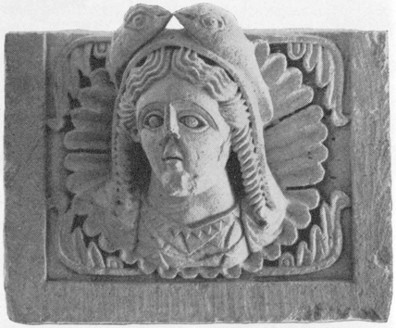
(Above image: A temple relief at nearby Khirbet et-Tannur)
Al-‘Uzzā (Arabic: العزى) is the Meccan goddess of power, might and the planet Venus as the Evening Star who was worshiped by the Arabian tribes of Banu Quraysh; Banu Sulaym; Banu Ghanim; Banu Ghatafan; Banu Khuza’a; Banu Thaqif, and Banu Kinãnah. The main idol of al-'Uzza, which the goddess herself was believed to often manifest in, was a cluster of three acacia trees that were situated in the valley of Nakhla near the town of Mecca. Al-'Uzza had a second temple (bayt) in Mecca called Buss which was made of brick, and was situated not far from her shrine at Nakhla. Inside the Buss temple was another important idol of al-'Uzza: a thigh bone shaped slab of granite which was venerated and offered sacrifice to by the pre-Islamic Arab tribes of the Hijaz, as they believed that the goddess herself spoke through the idol and would grant an oracle to the worshiper.
The Arabian tribes living around Mecca regularly sought the blessing and protection of al-'Uzza by offering sacrifices of animals and rarely human slaves or prisoners of war at an altar (‘Itr, madhbah) called al-Ghabghab which was located near the temple of Buss. The powerful Meccan tribe of Banu Quraysh would call upon al-'Uzza as a war goddess before going into battle and their women would perform music and sing chants exalting al-'Uzza; such as they did against the early Muslims in the Battle of Uhud. The last custodian (sadin) of al-'Uzza’s shrine was a man named Dubayyah ibn Haram as-Sulami, who had a reputation of being exceptionally generous, kind and hospitable until he was slain by Khalid ibn al-Walid, an early convert to Islam; who had also cut down the sacred trees of the goddess and destroyed her shrine upon the orders of Muhammad: this was done in order to effectively put an end to the cult of al-'Uzza among the Arabs of the Hijaz. In the south of Arabia, the kingdoms of Himyar and Yemen knew al-'Uzza as Uzzayan who was a goddess of healing; wealthy Himyarites would offer small golden images to Uzzayan on behalf of their sick children. The name Amat-'Uzzayan meaning “Maid of Uzzayan” was a popular women’s name in south Arabia, and the male theophoric name Abd al-'Uzza meaning “Devotee of al-'Uzza” was popular among the Meccans. Not so far from the Ka'aba itself in the valley of Hurad; the Banu Quraysh tribe dedicated a vale called Suqam to al-'Uzza, where they would visit to swear oaths and pray. During a battle, it was traditional for the women of Mecca to sing chants in the name of al-'Uzza and her consort, Hubal, to inspire valor in the warriors and gain victory against the enemy. The goddess al-'Uzzā was also known as al-Zuhara and Kawkabtā and was venerated by these names as the ruling goddess of the planet Venus; particularly in her incarnation as the Evening Star, which itself was believed to be either a manifestation of the goddess herself or her palace in the heavens. The planet Venus as the Morning Star was believed to be a male god called Athtar and was a separate divinity to the goddess al-'Uzza. The pre-Islamic Arabs also called upon al-'Uzza as Venus to bless and consecrate marriages. The equivalent of the Arabian al-'Uzza throughout the Semitic Middle East is the Canaanite war goddess 'Anat; the divine lover of the nature god Baal, who was named in Hebrew as ’l'Uzza Hayyim’ (’the strength of life’).
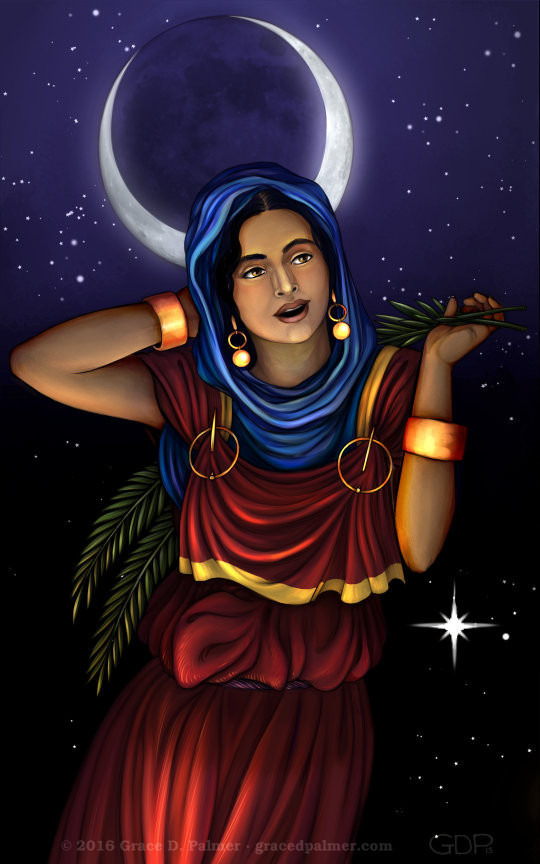
(Above image: Al-Uzzah by Grace D. Palmer)
[Text Source]
108 notes
·
View notes